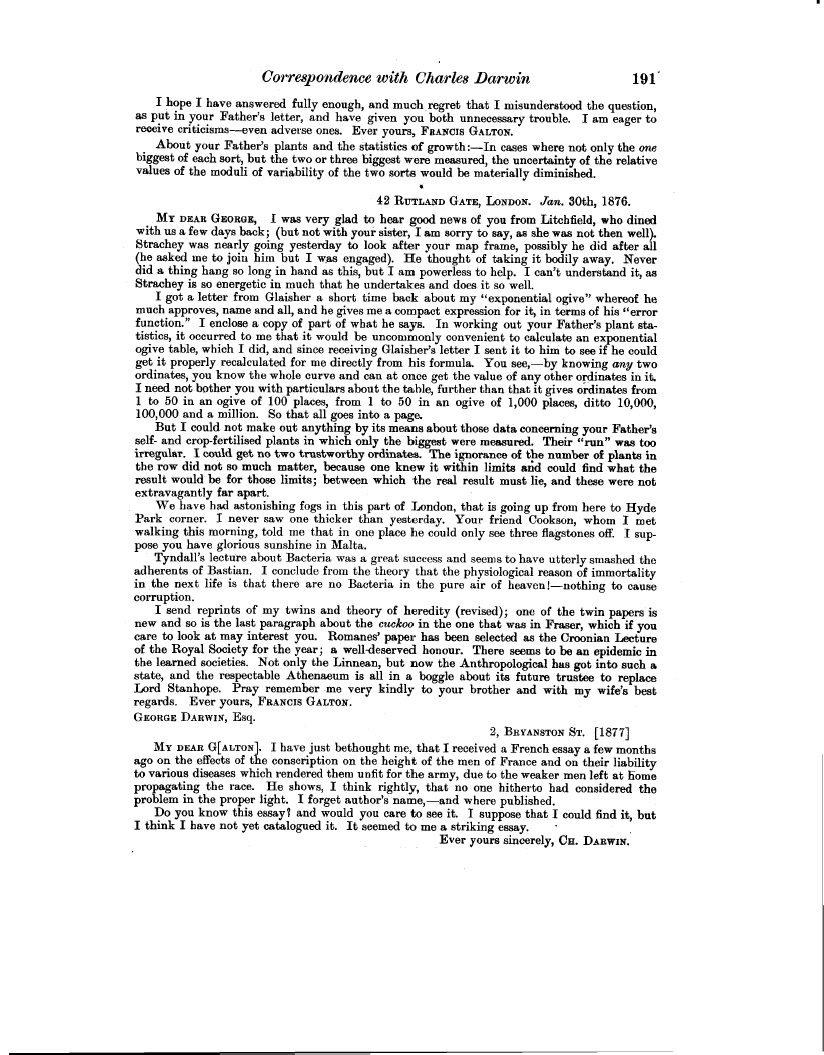Correspondence with Charles Darwin 191
I hope I have answered fully enough, and muchh regret that I misunderstood the question, as put in your Father's letter, and have given you both unnecessary trouble. I am eager to receive criticisms-even adverse ones. Ever yours, FRANCIS GALTON.
About your Father's plants and the statistics of growth:-In cases where not only the one biggest of each sort, but the two or three biggest were measured, the uncertainty of the relative values of the moduli of variability of the two sorts would be materially diminished.
42 RUTLAND GATE, LONDON. Jan. 30th, 1876.
MY DEAR GEORGE, I was very glad to hear good news of you from Litchfield, who dined with us a few days back; (but not with your sister, I am sorry to say, as she was not then well). Strachey was nearly going yesterday to look after your map frame, possibly he did after all (he asked me to join him but I was engaged). He thought of taking it bodily away. Never did a thing hang so long in band as this, but I am powerless to help. I can't understand it, as Strachey is so energetic in much that he undertakes and does it so well.
I got a letter from Glaisher a short time back about my "exponential ogive" whereof he much approves, name and all, and he gives me a compact expression for it, in terms of his "error function." I enclose a copy of part of what he says. In working out your Father's plant statistics, it occurred to me that it would be uncommonly convenient to calculate an exponential ogive table, which I did, and since receiving Glaisher's letter I sent it to him to see if he could get it properly recalculated for me directly from his formula. You see,-by knowing any two ordinates, you know the whole curve and can at once get the value of any other ordinates in it. I need not bother you with particulars about the table, further than that it gives ordinates from 1 to 50 in an ogive of 100 places, from 1 to 50 in an ogive of 1,000 places, ditto 10,000, 100,000 and a million. So that all goes into a page.
But I could not make out anything by its means about those data concerning your Father's self- and crop-fertilised plants in which only the biggest were measured. Their "run" was too irregular. I could get no two trustworthy ordinates. The ignorance of the number of plants in the row did not so much matter, because one knew it within limits and could find what the result would be for those limits; between which the real result must lie, and these were not extravagantly far apart.
We have had astonishing fogs in this part of London, that is going up from here to Hyde Park corner. I never saw one thicker than yesterday. Your friend Cookson, whom I met walking this morning, told me that in one place he could only see three flagstones off. I suppose you have glorious sunshine in Malta.
Tyndall's lecture about Bacteria was a great success and seems to have utterly smashed the adherents of Bastian. I conclude from the theory that the physiological reason of immortality in the next life is that there are no Bacteria in the pure air of heavenl-nothing to cause corruption.
I send reprints of my twins and theory of heredity (revised); one of the twin papers is new and so is the last paragraph about the cuckoo in the one that was in Fraser, which if you care to look at may interest you. Romanes' paper has been selected as the Croonian Lecture of the Royal Society for the year; a well-deserved honour. There seems to be an epidemic in the learned societies. Not only the Linnean, but now the Anthropological has got into such a state, and the respectable Athenaeum is all in a boggle about its future trustee to replace Lord Stanhope. Pray remember me very kindly to your brother and with my wife's best
regards. Ever yours, FRANCIS GALTON.
GEORGE DARWIN, Esq.
2, BRYANSTON ST. [1877]
MY DEAR G[ALTON]. I have just bethought me, that I received a French essay a few months ago on the effects of the conscription on the height of the men of France and on their liability to various diseases which rendered them unfit for the army, due to the weaker men left at home propagating the race. He shows, I think rightly, that no one hitherto bad considered the problem in the proper light. I forget author's name,-and where published.
Do you know this essay? and would you care to see it. I suppose that I could find it, but I think I have not yet catalogued it. It seemed to me a striking essay.
Ever yours sincerely, Cu. DARWIN.

